前景实用英语(二)-unit3教案
- 格式:pdf
- 大小:276.74 KB
- 文档页数:7
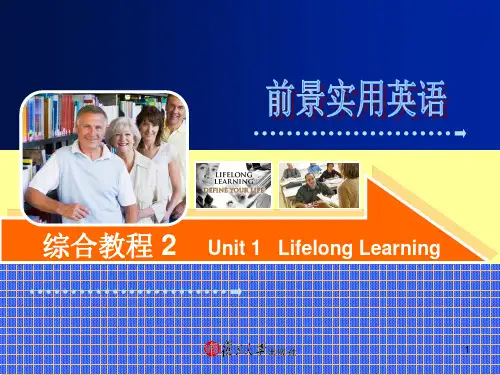

前景实用英语(二)-unit3教案三亚航空旅游职业学院教案编号Unit 3 Knowledge and SkillsTeaching aims:In this unit, students are supposed to▪know how to talk about learning in daily life;▪master the basic language to express reassuring and persuading;▪understand the main idea of Text A, and master the useful sentence structures and words and expressions;▪master the phonetic skill: assimilation;▪know substantive clause;▪know how to write “A Postcard”.Teaching procedures:I Listening and Speaking (2Period)II Text A & text-related exercises (2Period)III Workbook & text-related exercises (2Period)IV Grammar Review and Practical Writing (2Period)Part A Lead inTask 1 Study the pictures and discuss the questions below in small groups. Use the words given below if necessary.1.What are the people in the first picture doing?Cues: basketball, training, trainer, trainee2.How do you understand the words in the second picture? Do you knowthe Chinese for it ?Cues: the more ... the better ..., practice, learn, well3.What is “stage fright”?Cues: fear, anxiety, public, audience, sweaty handsTask 2 Listen to the following short dialogues and fill in the blanks.Task 3 Discuss the following questions.1. How can we learn a skill?Cues: knowledge, practice, familiar, second nature2.Have you ever had any experience of stage fright? If yes, please share onewith the class.Cues: knowledge, practice, familiar, second naturePart B Text ALearning Knowledge and Skill: PracticeLanguage points:Leakya. having holes or cracks that allow liquid or gas to escapee.g. Water came from the leaky roof.水从屋顶漏下来。
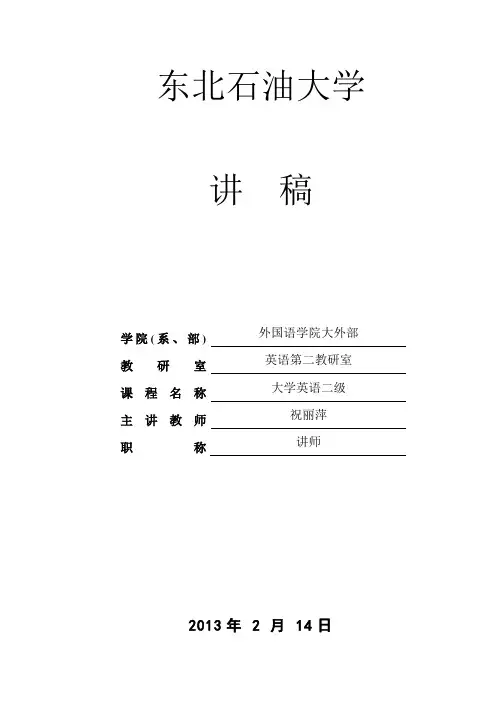
东北石油大学讲稿学院(系、部) 外国语学院大外部教研室英语第二教研室课程名称大学英语二级主讲教师祝丽萍职称讲师2013年 2 月 14日讲稿(首页)课程 名称 大学外语一级课程编号 11011002总计:64 学时 讲课:64 实验:上机:学 分4类别 必修课( √) 限选课( ) 任选课( )任课 教师 祝丽萍职称讲师授课 对象 第一次:专业班级:设计11-2,11-3 共 2 个班 第二次:专业班级: 共 个班 第三次:专业班级: 共 个班基本 教材 主要 参考 资料《前景实用英语》1《前景实用英语教师用书》1 《新世纪大学英语听说教程》1Longman Dictionary Of Contemporary English 《英汉多功能词典》外语教学与研究出版社John Langan, Colleg Writing Skills, Mcgraw-Hill Book Company,1984 《剑桥国际英语短语动词词典》,上海外语教育出版社,1999,12 《剑桥国际英语成语词典》,上海外语教育出版社,1998 教学 目的 要求一、了解大学英语教学大纲中规定的单词和词组 二、了解词语搭配和从句的用法 三、了解写作技巧四、了解有关的背景知识 五、培养学生的英语运用能力 教学 重点 难点1重点:new words2难点:vocabulary and structuretext structure analysis listening skill reading skill writing skill授课题目(教学章、节或主题):Unit 1 Part A Lifelong Learning授课方式(请打√)理论课□√讨论课□实验课□习题课□其他□课时安排2学时教学目的及要求(分掌握、熟悉、了解三个层次):一、掌握大学英语教学大纲中规定的单词和词组二、掌握词语搭配和从句的用法三、了解有关和本单元有关的背景知识教学重点、难点、关键知识点及采用的措施:1重点:Proficiency Training、new words2难点:collocation and structure3思考题:structured writing方法及手段多媒体辅助教学,板书, 课堂讲授教学基本内容(教学过程)Unit One Part ATask I Lead inStudy the pictures and discuss the questions below in small groups.Use the words given below if necessary.Suggested Answers:1.Who are the people in each picture?What’s their relationship?2.Where arc they?What are they doing?3.Do you think they enjoy what they are doing now?In the first picture,some young people are playingfootball.In the second picture,many college students are inclass.Maybe they are classmates or just sports friends.In thethird picture,a girl is taking out/putting back a book froma bookshelf.She is obviously in the library.I think people inthese pictures are enjoying themselves.设计思路●给山大学生活中某些场景的图片,导入“终生学习”这个话题。

教案首页2016-2017 学年第一学期专业:课程名称:高职英语班级:主讲教师:Unit 1 CollegePeriod 1-2Part A Lead-in and Text ATeaching aims:1.Help freshmen get familiar with the studies and lives in college and discuss about it;2.Master the useful words and expressions in Text A;Teaching important points:1. Ss. Learn some new words and use them in the discussion2.New words and expressions in Text ATeaching difficult points:Ss. Learn how to talk about college lifeTeaching steps:Step 1Greetings and a brief introduction of English learning scheduleStep 2 Lead-in1.Warm-up questions:Do you like your college life? What differences are there between college and high school life?2.Study the pictures on page 2 and discuss the questions below in small groups.1)Who are the people in each picture? What’s their relationship?Cues: students, classmates, sports friends2)Where are they? What are they doing?Cues: classroom, football field, library, listening, playing, looking for3)Do you think they enjoy what they are doing now?Cues: very much so, not at allStep 3 SpeakingReview the sentences drills about greeting and introduction; let some pairs practice them Step 4 Listening1.Read the instruction as a class.2.Play the recording twice, and check Ss’Exs. and repeat some sentences ifnecessaryanize a class discussion based on this task. Then ask Ss. to think aboutmethods to improve their English listening skills.Step 5 Text A1.Ss. learn some words and phases from vocabulary2.Lead-in1)Warm-up questions.e.g. Do you think Chinese college life is very different from western one?2) A brief introduction of American college life to arouse Ss’ interest3.ScanningAsk Ss. read the Text very quickly and get the main idea.4.Ss. finish the Task 1 and then check the answersStep 6 H.WFinish Task 2-4 on page 10-12Period 3-4Text A :The Freshman Experiences: College is not summer camp Teaching aims:1. understand the passage completely;2. master the key words, expressions & sentence patterns in Text ATeaching important points:1. the structure of the Text A2. New words and expressions in Text ATeaching difficult points:understand the passage completelyTeaching steps:Step 1 GreetingStep 2 Revision and Check the answers from Task 2-4Step 3 scanningSs. read the text again and find some difficult sentences to ask for help ;Teachers and Ss. solve these difficulties togetherStep 4 Intensive readingList some language points –some important words and difficult sentences1. imaginev. to form a picture in your mind of what something might bee.g. She imagined singing her favorite song on a big stage.她想象着自己在一个巨大的舞台上唱自己最喜欢的歌曲。
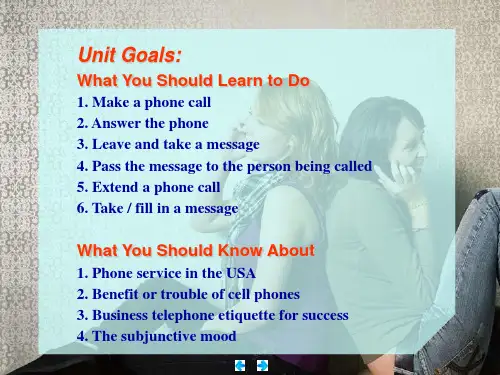
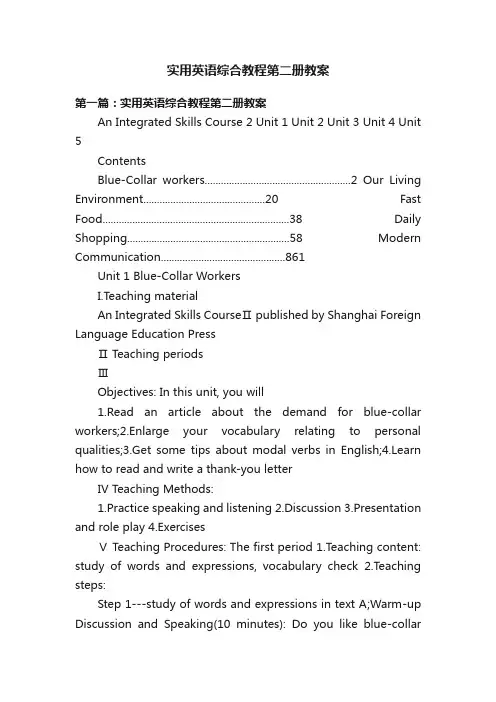
实用英语综合教程第二册教案第一篇:实用英语综合教程第二册教案An Integrated Skills Course 2 Unit 1 Unit 2 Unit 3 Unit 4 Unit 5ContentsBlue-Collar workers......................................................2 Our Living Environment.............................................20 Fast Food.....................................................................38 Daily Shopping............................................................58 Modern Communication. (861)Unit 1 Blue-Collar WorkersI.Teaching materialAn Integrated Skills CourseⅡ published by Shanghai Foreign Language Education PressⅡ Teaching periodsⅢObjectives: In this unit, you will1.Read an article about the demand for blue-collar workers;2.Enlarge your vocabulary relating to personal qualities;3.Get some tips about modal verbs in English;4.Learn how to read and write a thank-you letterⅣ Teaching Methods:1.Practice speaking and listening2.Discussion3.Presentation and role play4.ExercisesⅤ Teaching Procedures: The first period 1.Teaching content: study of words and expressions, vocabulary check 2.Teaching steps:Step 1---study of words and expressions in text A;Warm-up Discussion and Speaking(10 minutes): Do you like blue-collarjobs? What is your favorite blue-collar job and why?Hints: I like blue-collar jobs because(1)the demand is huge;(2)you can get professional training and technical knowledge;(3)the salary is goodMy favorite blue-collar job is that of a gardener, because(1)I can work outdoors and enjoy the fresh air;and(2)I can keep fit and get good pay(The students will probably have trouble with English expressions relating to blue-collar jobs.The teacher may allow the students to answer this question in Chinese, and then give the students key terms in English and ask them to express their ideas again in English.)Background Information(5 minutes)Blue-collar workers(TB P2)Different categories of jobs(blue-collar/golden-collar/pink-collar/grey-collar/white-collar)Introduce new words on board:(20 minutes)heartland resident workforcereplacementreplaceshortage manufacturermanufacture remarkable recoveryannualearnings earnpoint togap high-end decline expand certificateprograminvestmentinvest find a way upStep 2—Practice: Vocabulary Check and Oral English(10 minutes)Give students 5 minutes to finish exercises A in Page 9Everyday English 1.If you want to stop someone and ask him/her for directions, what do you usually say to him/her first?(Excuse me.)2.If you don’t quite understand what the person has told you about the directions, what can you do?(Although one can always say “I beg you pardon?” or “Could you say it again?” try not to make the person repeat more than twice.Instead, you may repeat what you’ve already understood and let the person tell you the test.)3.While traveling in a foreign country, what would you bring along to make your travel easier?(A road map.)The second period 1.Teaching content: Discussion and Comprehensive of Text A 2.Teaching steps:Step 1---Warm up(10 minutes)(invite some students to explain the meaning of the difficult sentences of the text A in English or in Chinese, teacher may give them some hints.) Step2---Language Points(25 minutes)1)To many… offer its residen ts: For many people, America’s industrial heartland can’t provide enough work to its residents.too little: not too much, not enough 太少Too much work and too little rest often lead to illness.过量的工作和过少的休息会引起疾病。
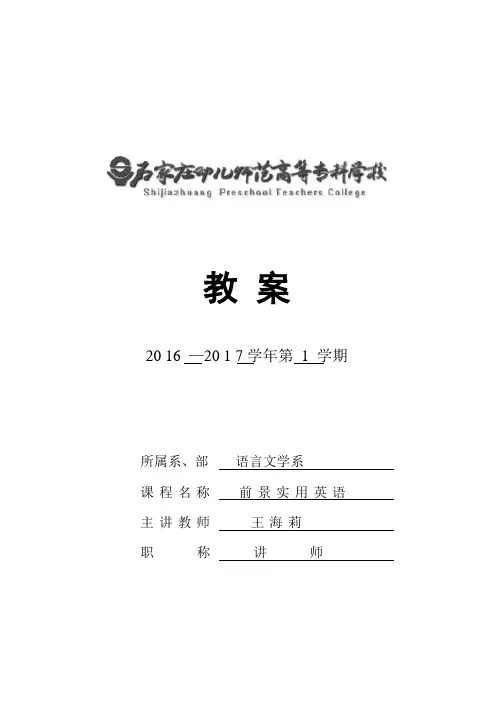
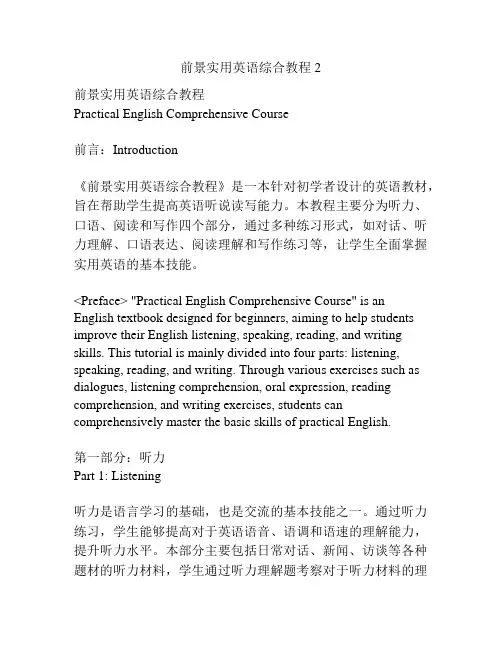
前景实用英语综合教程2前景实用英语综合教程Practical English Comprehensive Course前言:Introduction《前景实用英语综合教程》是一本针对初学者设计的英语教材,旨在帮助学生提高英语听说读写能力。
本教程主要分为听力、口语、阅读和写作四个部分,通过多种练习形式,如对话、听力理解、口语表达、阅读理解和写作练习等,让学生全面掌握实用英语的基本技能。
<Preface> "Practical English Comprehensive Course" is anEnglish textbook designed for beginners, aiming to help students improve their English listening, speaking, reading, and writing skills. This tutorial is mainly divided into four parts: listening, speaking, reading, and writing. Through various exercises such as dialogues, listening comprehension, oral expression, reading comprehension, and writing exercises, students can comprehensively master the basic skills of practical English.第一部分:听力Part 1: Listening听力是语言学习的基础,也是交流的基本技能之一。
通过听力练习,学生能够提高对于英语语音、语调和语速的理解能力,提升听力水平。
本部分主要包括日常对话、新闻、访谈等各种题材的听力材料,学生通过听力理解题考察对于听力材料的理解和把握能力。

教案首页2021-2021 学年第一学期专业:课程名称:高职英语班级:主讲教师:Unit 1 CollegePeriod 1-2Part A Lead-in and Text ATeaching aims:1.Help freshmen get familiar with the studies and lives in college and discuss about it;2.Master the useful words and expressions in Text A;Teaching important points:1. Ss. Learn some new words and use them in the discussion2.New words and expressions in Text ATeaching difficult points:Ss. Learn how to talk about college lifeTeaching steps:Step 1Greetings and a brief introduction of English learning scheduleStep 2 Lead-in1.Warm-up questions:Do you like your college life? What differences are there between college and high school life?2.Study the pictures on page 2 and discuss the questions below in small groups.1)Who are the people in each picture? What’s their relationship?Cues: students, classmates, sports friends2)Where are they? What are they doing?Cues: classroom, football field, library, listening, playing, looking for3)Do you think they enjoy what they are doing now?Cues: very much so, not at allStep 3 SpeakingReview the sentences drills about greeting and introduction; let some pairs practice them Step 4 Listening1.Read the instruction as a class.2.Play the recording twice, and check Ss’Exs. and repeat some sentences ifnecessaryanize a class discussion based on this task. Then ask Ss. to think aboutmethods to improve their English listening skills.Step 5 Text A1.Ss. learn some words and phases from vocabulary2.Lead-in1)Warm-up questions.e.g. Do you think Chinese college life is very different from western one?2) A brief introduction of American college life to arouse Ss’ interest3.ScanningAsk Ss. read the Text very quickly and get the main idea.4.Ss. finish the Task 1 and then check the answersStep 6 H.WFinish Task 2-4 on page 10-12Period 3-4Text A :The Freshman Experiences: College is not summer camp Teaching aims:1. understand the passage completely;2. master the key words, expressions & sentence patterns in Text ATeaching important points:1. the structure of the Text A2. New words and expressions in Text ATeaching difficult points:understand the passage completelyTeaching steps:Step 1 GreetingStep 2 Revision and Check the answers from Task 2-4Step 3 scanningSs. read the text again and find some difficult sentences to ask for help ;Teachers and Ss. solve these difficulties togetherStep 4 Intensive readingList some language points –some important words and difficult sentences1. imaginev. to form a picture in your mind of what something might bee.g. She imagined singing her favorite song on a big stage.她想象着自己在一个巨大的舞台上唱自己最喜欢的歌曲。
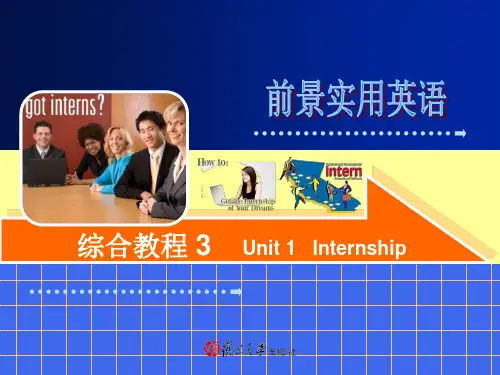
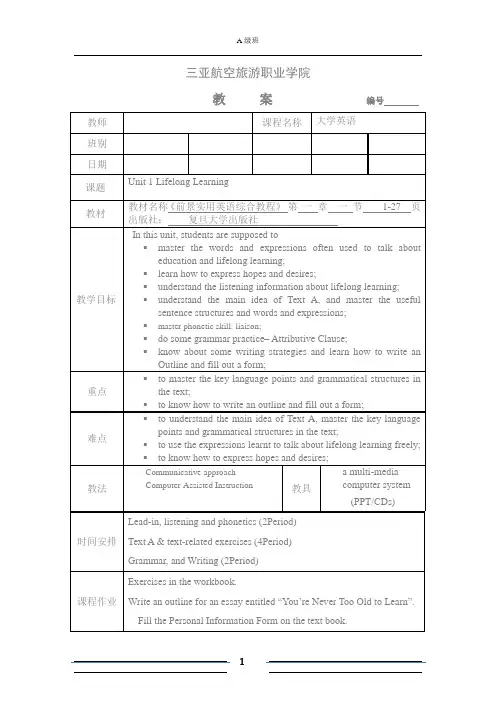
三亚航空旅游职业学院教案编号Unit 1 Lifelong Learning●Teaching MaterialForward English for Practical Purposes, Book 1, Unit 1●Teaching Aims:In this unit, students are supposed to1.master the words and expressions often used to talk about education andlifelong learning;2.learn how to express hopes and desires;3.understand the listening information about lifelong learning;4.understand the main idea of Text A, and master the useful sentence structuresand words and expressions;5.master phonetic skill: liaison;6.do some grammar practice– attributive clause;7.know about some writing strategies and learn how to write an Outline and fillout a form.●Teaching Emphasis1.to master the key language points and grammatical structures in the text;2.to know how to write an outline and fill out a form.●Teaching Difficulties1.to understand the main idea of Text A, master the key language points andgrammatical structures in the text.2.to use the expressions learnt to talk about lifelong learning freely.3.to express one’s hopes and desires.●Teaching ApproachesCommunicative approach and Computer-Assisted Instruction●Teaching Aidsa projectora multi-media computer system●Teaching Procedures and contents (8 periods)Part A Lead inTask 1Study the pictures and discuss the questions in small groups.1.Do you think it’s too late for middle-aged people to go to college?2.What does the second picture tell us?3.Why do you think lifelong learning is important?Task 2 Listen to the short dialogues and fill in the blanks.Task 4 Listen to the recording, and complete the passage.Task 5Discuss the following questions with your partner about your understanding of lifelong learning.1.Currently, it’s not easy for graduates with higher education degrees to find anideal job, so some people argue that education is of little use. What’s your view on this?2.How do you understand the saying “It’s never too old to learn”?Text AWhy We Need New SkillsLanguage and Cultural Points in the TextPara. 1recessionn. a general slowdown in economic activityNote: “The recession” here refers to the worldwide financial crisissince 2008 and its aftermath.erasev. to remove all traces of somethinge.g. He erased the pencil marks to keep the book clean.为保持书的整洁,他擦去了铅笔痕迹。
幻灯片1Unit1-main1I. ObjectivesII. Suggested Teaching PlanIII. Background InformationIV. Class Presentation幻灯片2Unit1-main2Part IListeningPart II ReadingPart III SpeakingPart IV Translation & WritingPart V Time to RelaxVideo Exercises幻灯片3ObjectivesI. ObjectivesAfter studying this unit, the students are expected to1. have listening and speaking practices to learn how tolive up to their potential and acquire the theme-related expressions and their functional structures;2. understand the main idea of Text A and Text B, masterthe useful sentence structures, words and expressionsfound in the relevant exercises of the texts;3. know how to use parallel structures to add balance,rhythm and clarity to the sentences;幻灯片4ObjectivesI. Objectives4. be able to read a passage about how to advertise on a website;5. be able to write a letter of accepting/declining an offer.幻灯片5II. Suggested Teaching Plan for Unit 1TimeContents Plan1 period Theme-relatedListening Sections 1 & 2To start the new unit, the teacherA. plays the short talk once before handling UsefulLanguage in a unique way, ., asking studentsto read them loud in class;B. plays the short talk once more, or twice moreifnecessary, and asks class to complete thesummary as required; C. has a brief discussion with the students on thesummary of the short talk;D. plays the talk again with an emphasis on detailsso that students can fill in the blanks of the text. Sections 3 4 & 5A. keeps the theme in mind while making atransition from the short talk to the two dialogues;幻灯片6Objectives3B. handles Useful Language in a unique way,., asking students to come up with theirown equivalents to replace the items in the box;C. plays the first dialogue once, or twice ifnecessary, and asks students to do the T/Fexercise as required to explore the main idea;D. plays the first dialogue once more for thedetails so that students will have no troubleanswering the questions;E. plays the second dialogue once, or twice ifnecessary, and then asks students to do thelistening comprehension exercises;F. checks the answers in a meaningful way,., putting the key word effort on thechalkboard, encouraging the students toaround it with the relevant information fromthe dialogue.Theme-relatedListening幻灯片7Time Contents PlanObjectives3Review ofTheme-relatedListeningSections3 periodsReviewThe teacherA. has a brief review of what students havelearned in the first period of listeningpractice;B. makes a meaningful transition to Text A.StarterAfter finishing the listening tasks, the teacher turns to Text A of the unit. To begin, the teacher Text A &Text-relatedExercisesA. lets the students figure out what the title of Text A can mean. This can be done in complete English sentences or just phrases. If the students have difficultyTime Contents Plan幻灯片8Objectives4Timedoing this, the teacher can ask them to think of a situation where impossibility becomes a fact. The teacher can provide them with the following key words in English: happen, years ago, absolutely impossible, think of, give up, make sincere efforts, find a clue, turn out, solve the problem.B. gives the students 10 minutes to read TextA and find out the cause of the problem for thecar in the story and asks them to tell whatlessons can be drawn from the story.幻灯片9Time Contents Plan Contents PlanThe teacherA. discusses the whole text with the students;B. guides the students through the exercises,focusing on certain items or leaving someexercises as the students’homeworkaccording to the students’levels.The teacherA. asks the students to go over the text and do the multiple choice questions about it;B. while discussing the text with the students, calls the students’attention to the use of parallel structures and their functions;C. lets the students do the vocabulary and language use exercises either in class or after class.periodsText B &Text-relatedExercises幻灯片10Objectives5periodPracticalReadingThe teacherA. explains the passage about how to advertiseon “Paperboy;”B. gives the students 5 to 10 minutes to do theexercise.1 periodSpeakingThe teacherA. fully understands what the exercises are intended to do;B. in Ex. 1 initiates a discussion on each statement of the list to ensure a better understanding on the part of students, and then help students know what two categories are before they do the exercises as required;幻灯片11Objectives6Time Contents PlanC. asks class to read loud the dialogue in Ex. 1 before doing the role-play either with the script used by turns or with it completely free;D. in Ex. 2 has a brief review of the core theme of Text A to elicit the important statement: I am possible, and then asks one student to read loud the example monologue before encouraging some students to carry out the task.Translation and Writing,Time toRelax &Workbook1 periodThe teacherA. leaves the sentence translation exercise as the students’homework;幻灯片12Time Contents PlanTime Contents Planfirst exercise in Practical Writing, and then requires them to do the next two exercises after class;C. plays the record of the story “Blue Suit”in class and lets the students work out what makes the problem- solving humorous (This can be done as students’homework if there isn’t much time left in class);D. if possible, plays the video in theWorkbook in class and lets the students dothe exercise based on the video.幻灯片13III. Background Information1General Motors 通用汽车General Motors is an American multinational automaker based in Detroit, Michigan and the world’s second largest automaker. Founded in on Sept. 16, 1908, GM now employs 209,000 people in every major region of the world and does business in some 157 countries. General Motors produces cars and trucks in 31 countries, and sells andservices these vehicles through the following divisions: Buick, Cadillac, Chevrolet, GMC, Opel, Vauxhall, and Holden. GM’s OnStar subsidiary(子公司) provides vehicle safety, security and information services.幻灯片14III. Background Information1Pontiac 庞蒂亚克Pontiac was an automobile brand that was established in 1926 as a companion make for General Motors’Oakland. Pontiac was sold in the United States, Canada, and Mexico by General Motors (GM). Pontiac was relatively more popular in Canada, where for much of its history it was marketed as a low-priced vehicle.On April 27, 2009, amid ongoing financial problems and restructuring efforts, GM announced it would discontinue the Pontiac brand by the end of 2010 and focus on four core brands in North America: Chevrolet, Cadillac, Buick, and GMC. The last Pontiacs were built in late 2009, with the final dealer franchises expiring October 31, 2010.幻灯片15III. Background Information1Dessert 甜点In Western culture, dessert is a course that typically comes at the end of a meal, usually consisting of sweet food. The word comes from the French language as dessert, “to clear the table”and “to serve.”Common desserts include cakes, cookies, pastries, ice cream, pie, and candies. Fruit may also be eaten with the dessert.The word dessert is most commonly used for this course in ., Canada, Australia, New Zealand and Ireland, while sweet and pudding may be alternative terms used in the UK and some other Commonwealth countries, including India. In England, the term pudding is usually used among the upper and upper-middle classes, with dessert only used if the course consists of fruit or sweetmeats, after the cheese and biscuits course.幻灯片16Part IListeningPart IListeningListentotheupcomingshorttalkandfillintheblanksinthesummarybelowwithtwoorthreewords.Get tingtoknowthefollowingusefullanguagefirstmightbehelpful.1Useful Languageabbreviation // n. 缩写intend // vt. 意欲critically // ad. 批判地tough // a. 艰难的seemingly // ad. 看来似乎challenge // n. 挑战solution // n. 解决方法hows and whys 缘由,道理幻灯片17ScriptPBL is intended to train students to be 1) . To be a problem solver is to learn how to raise a question,how to use information, how to 2) , and how to make a decision. Of course, it is not easy to a problem solver.But it is no good to say something is impossible without 3), even though it can seem so at first. Only when you give yourself completely 4) is nothing impossible.problem solvers________________think critically_____________making an effort________________to the possible_______________幻灯片18Script:Hello class,Does PBL ring a bell It is an abbreviation for problem-based learning, an education model that intends to train students to become problem solvers. This means that students learn how to think critically, how to raise important questions, how to use the information gained, and how to make decisions when solving a particular problem. Do you think this is what is supposed to be happening at college Or is the goal to stay passive receiving knowledge from the instructor all the time幻灯片19Of course, it is not easy to be a problem solver. A particular problem can be difficult and tough, at first seemingly impossible to solve. Yet let’s not forget that the toughest challenge can also offer the greatest opportunity. So don’t just say something is impossible without making an effort. Give it a try and you might find out you can go much farther than you expected.In short, there’s no way to get to solutions without first exploring the hows and whys of the problem. What happens happens for a reason. Only when you are open to the possible is nothing impossible.幻灯片20Objectives22Listen to the short talk again and fill in the blanks below with the missing words. 2Hello class,Does PBL ring a bell It is an abbreviation for 1), an education model that intends to 2)to become problem solvers. This means that students learn how to think critically, how to raise important questions, how to use the information gained, and how to make decisions when solving 3) . Do you think this is what is supposed to be happening 4) Or is the goal to 5)receiving knowledge from the instructor all the timeproblem-based learning________________________train students______________a particular problem___________________at collegestay passive_______________________幻灯片21Objectives23Of course, it is not easy to be a problem solver. A particular problem can be 6), at first seemingly impossible to solve. Yet let’s not forget that the toughest challenge can also offer 7) . So don’t just say something is impossible without 8). Give it a try and you might find out 9)much farther than you expected.In short, there’s no way to get to solutions without first exploring the 10)of the problem. What happens happens 11). Only when you are open to the possible is 12) . difficult and tough_________________the greatest opportunity_______________________making an effort_________________you can go___________hows and whys________________for a reason_____________nothing impossible___________________幻灯片22Objectives24MartinandLisaaretalkingaboutpossibilityand impossibility.Listentotheirconversationand thendecidewhether theconversation-basedstatementsbelowaretrue(T)orfalse(F).Gettingtoknowthefollowingusefullanguagefirstmightbehe lpful.3Useful Languagenegative // a.stuck // a.belief // n.The point is simply that…Couldn’t have said it better.billboard // n.You betcha!否定的;消极的被困住信念其要点是……说得太好了。
Unit 3 Learning1. Topic: Learning2. Teaching objectives:After the class, the students will be able to1) Know the different styles of learning2) Provide multiple opportunities for the students to practice interactive speaking and listening.3) Focus on the correct pronunciation and intonation.4) Master the key words and structures.3. Difficulties and keys:1) V ocabulary: (omitted)2) Speaking: Making and Asking for suggestion3) Grammar: Model verbs4) Practical writing: How to write an invitation4. Teaching Aids:(1) Blackboard,(2) Multimedia system,(3) PPT6. Time Allotment:(1)Lead in and New Words (30mins) (2) Analysis of the Text (90mins)(3) Exercises (90mins) (4) Grammar Tips and Writing (60mins)(5) Listening (60mins)7. Teaching methods and strategies(1)Practice speaking and listening(2)Discussion(3)Presentation and role play(4) Exercises8. Teaching ProcessPeriod 1:Step 1. Lead-in (5 minutes)Study the pictures and discuss the questions below in small groups..Question:1. where are those people in the two pictures on the left?2. Do you listen to MP3 or put a pen or a pencil in your mouth while you are studying?3. Are pictures helpful to you in memorizing English words?Hint:Step 2. Listening exercise (10 minutes)Step 3. Vocabulary in Text A (20 minutes)Ask Ss to read new words and expressions by themselves and then read the new words together. Explain the important points.1. unique a. being the only one of its kinde.g. Everyone’s fingerprints are unique..2. in general : usually; as a wholee.g. In general, an English dictionary starts with the letter A.3. visual a. of or gained by seeing or sight.e.g. The teaching building makes a tremendous visual impact.Step 4. Vocabulary Check Task 3&4 (10 minutes)Ask the students to finish the exercise, vocabulary check (part B and C). Then check the answers.Period 2:Step 1. Language Points in Text A (30 minutes)Explain the language points to Ss and analyze the structure of the passage. Pay more attention to longer sentences in Text A and try to make Ss understand.Kinaesthetic learners can have…especially past elementary age:Because traditional schools pay less attention to kinaesthetic learners than to auditory and visual learners, kinaesthetic learners can have the most difficulty in their learning, especially when they finish elementary school and grow older.Step 2. Comprehension of Text A (15 minutes)Give students 5 minutes to go through the text, ask them to finish the exercise then check the answers.Period 3:Step 1. Comprehensive Exercises (45 minutes)Ask the students to finish the exercise then check the answers.Period 4:Step 1. Phonetics (20 minutes)Ask the students to pay more attention to the Rising Diphthongs and then do some listening and speaking.Step 2. Grammar Tips 情态动词( Model Verb) (20 minutes)First, ask Ss to preview the explanation and then give further study of the grammar tip. Do the exercises to check out whether Ss know the grammar well.Period 5&6: Practical Writing (How to Write an Invitation)It is necessary to teach some writing skills beforehand, and then study the sample. Ask Ss to write a note on the spot.Step 1. General Introduction (10 minutes)Step 2. Sentence patterns for Invitation (15 minutes):Introduce some useful sentence patterns to help students understand how to write a thanks note.1...would be delighted for you to join them.2...request the honor of your presence…3. …would like to invite you to …Step 3. In-class Activities (20 minutes)This section contains short dialogues that making and asking for suggestions in campus.Step 4. Speaking Out (10 minutes)This part is designed for students using certain expressions to ask for suggestions. Period 7&8:Step 1. Culture Notes (15 minutes)Let the students read this section on their own. The teacher may want to check if they have read this section by asking the following questions:Step 2. After-class Activities (30 minutes)Although the exercises included in this part are meant for the students to practice in their spare time, the teacher may want to select some of them to practice in class, especially those in Sections A and B. Unlike those in Book One, the exercise items included in Section B are mini-dialogues designed to prepare the students for the standardized examination they are to take in the following year.9. Text review and consolidation(5min)(1) Key words of each para.(2) Important Phrases10. Homework Assignment(2min)(1) Words and expression study(2) Finishing the exercises of the text11. Questions from/Discussions with the students(5min)12. Reflection of the class teaching:(1) Have key points every class and dictate in next, and give students press to study.(2) Try to go more opportunities for the poor-level students.。